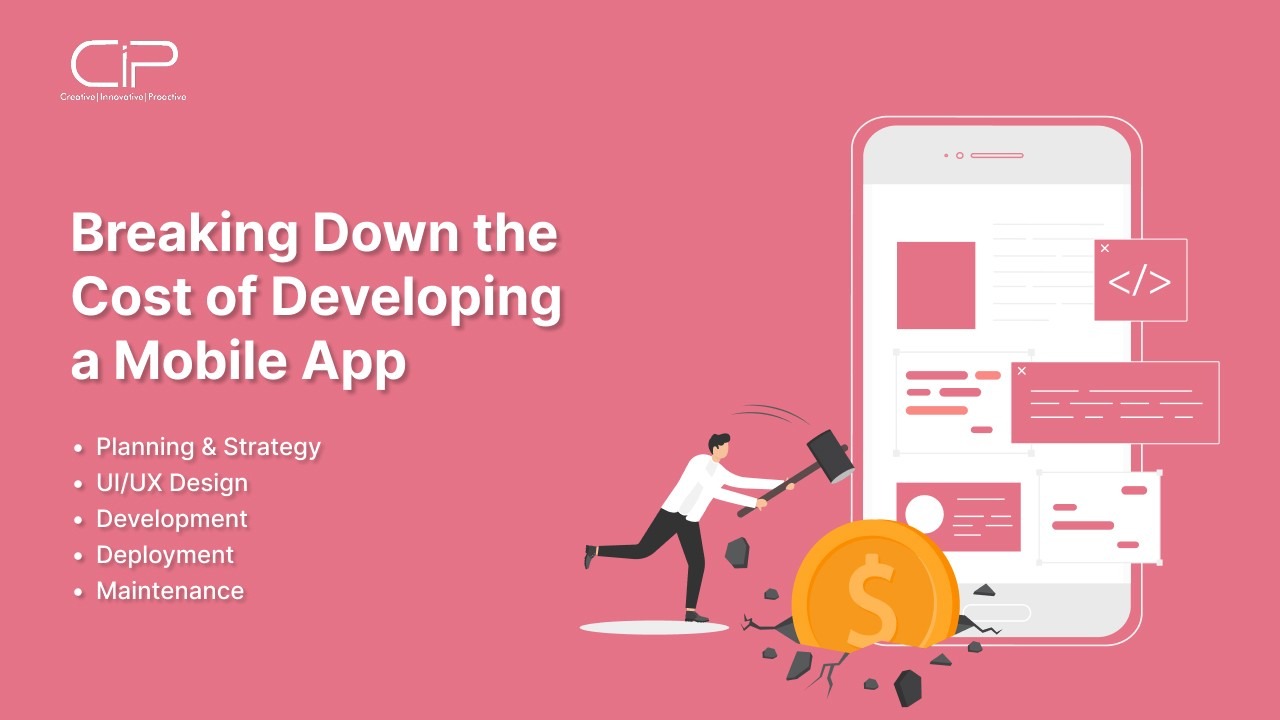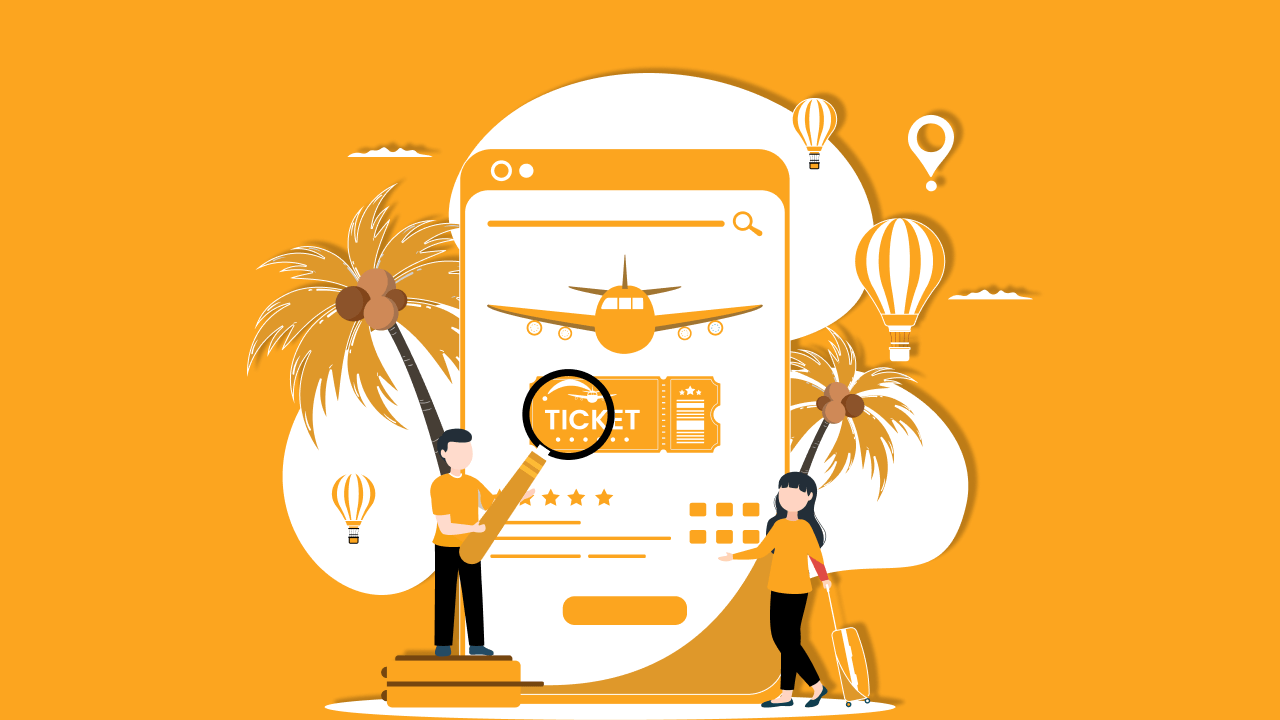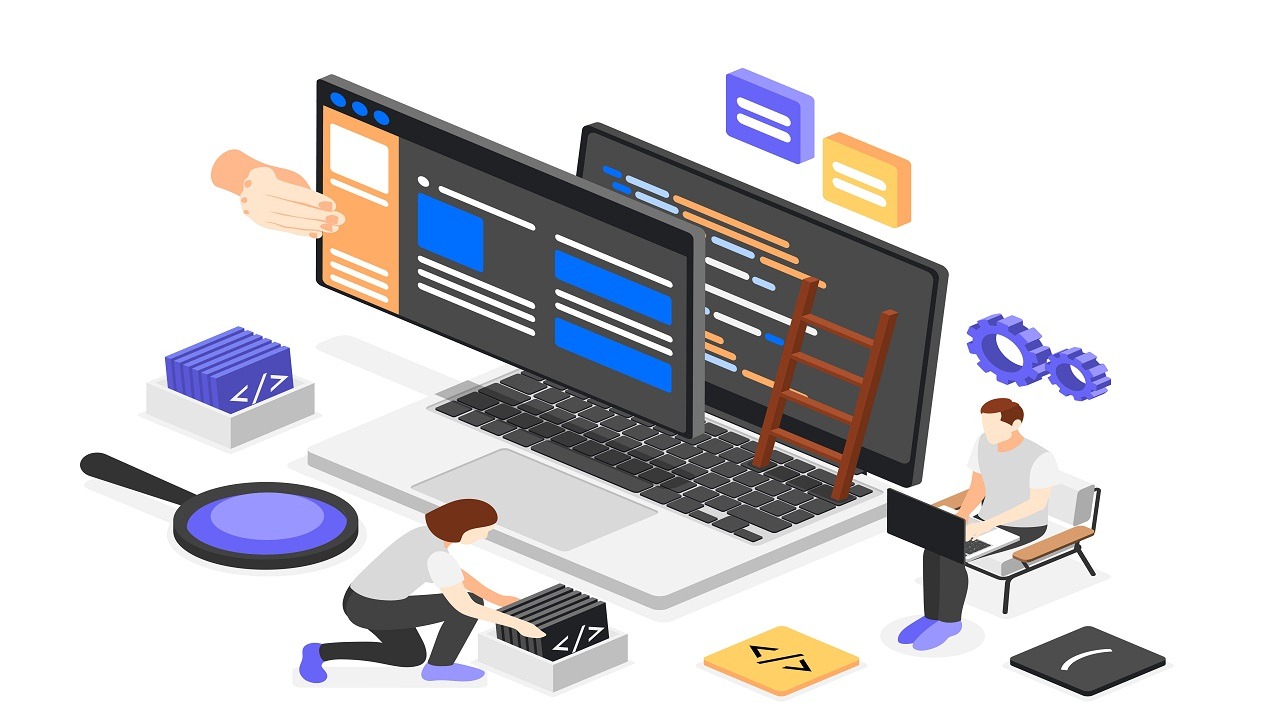The cost of mobile app development in the UAE depends on multiple factors, such as app complexity, duration, type, and platform ( iOS, Android ).
Usually, the average hourly cost of top mobile app developers in the UAE is AED 30,000 to AED 110,000. Pricing of communicative digital solutions or interactive Android & iPhone mobile apps is helping in creating a secure platform to personalize user experiences and build brand loyalty that directly influences the pricing of the development as per app complexity.
In terms of optimizing the service quality and improving the productivity of resources by maximizing ROI. Before selecting any mobile app development company in UAE, prioritize considering the factors that affect the overall budget, when it’s necessary to break down the cost of developing a mobile, and consider the reasons why it’s essential to consider the price.
Key Factors Influencing Mobile App Development Cost
Considering the cost of mobile app development in the UAE, multiple factors affect the overall budget of the process, such as app complexity, platform choice, backend infrastructure, and maybe integrations.
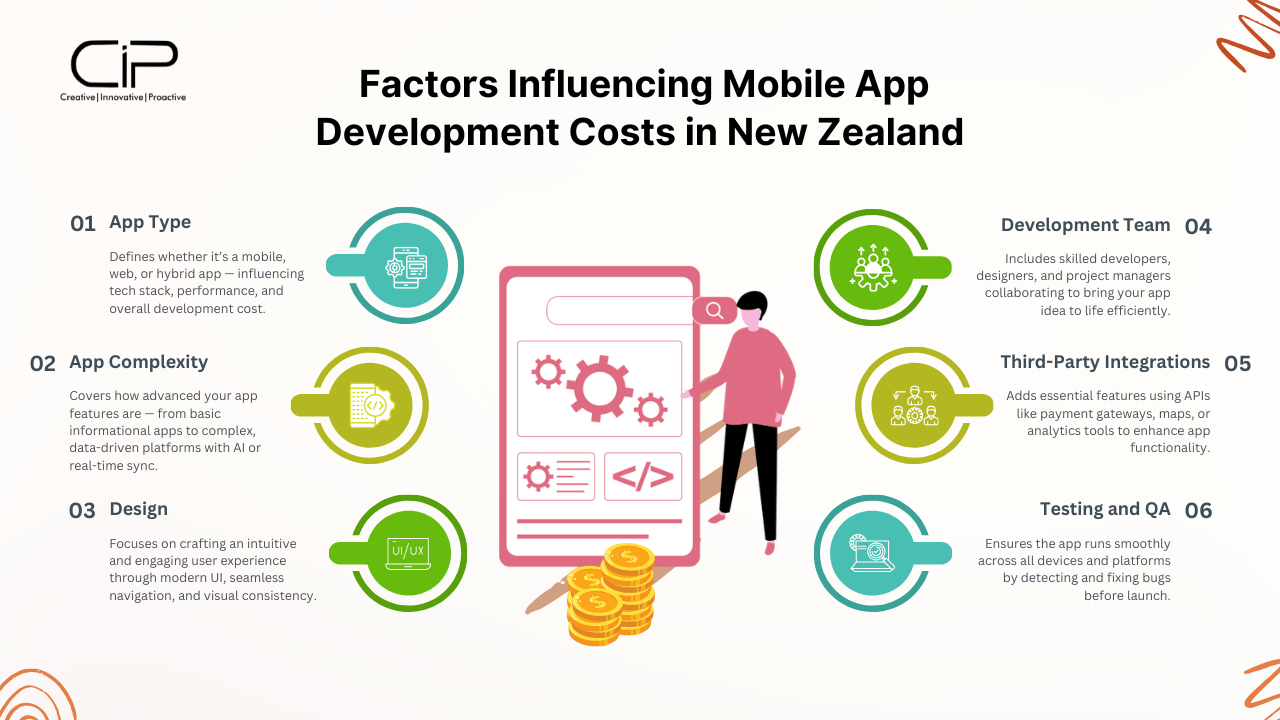
1. App Type
The type of mobile app, whether it’s native, hybrid, or web-based, plays a significant role in determining the cost. Native apps, usually designed separately for iOS and Android, result in making the app more expensive due to the need for separate codebases, testing, and deployment.
Hybrid apps usually make for multiple platforms, require a single codebase, are generally more cost-effective, but some lack platform-specific features. Web-based apps are the least expensive since they operate in a browser and don’t require app store submissions or extensive platform-specific adjustments.
The app’s core purpose, whether it’s for e-commerce, gaming, enterprise, or social networking, will also affect the complexity and overall cost.
2. App Complexity
The complexity of the app, whether it’s about creating simple or advanced, directly impacts the development cost. Simple apps require basic tools or information-based applications, require fewer features and functionalities, which makes the development process faster and cheaper.
On the other hand, apps with high-end features such as real-time communication, geolocation, or advanced integrations require more advanced coding and testing, leading to higher costs. The number of screens, third-party integrations, and user permissions can add more complexity and increase the price.
3. Design
App design is crucial for user experience and can influence development costs. A well-crafted, intuitive UI/UX design increases the entire user retention and engagement but requires more significant time and expertise. Custom designs involve detailed graphics, animations, and transitions, which will naturally raise the cost.
Suppose the design needs to be unique and tailored to brand guidelines that require longer and specialized resources.
On the other hand, using pre-built design templates or simpler interfaces can reduce the cost, though they might not deliver the same high-quality user experience.
4. Development Team
The cost of the development team is a substantial factor in the enhancement of the development cost. Mobile app development requires a combination of front-end developers, back-end developers, UI/UX designers, and project managers. The expertise and geographical location of the team impact the cost.
Development in the UAE results in making processes more expensive than outsourcing to countries with lower labor costs, like India or Southeast Asia. In the UAE, skilled developers are in high demand, so expect to pay premium rates for local expertise. Additionally, the size of the team will scale based on the app’s complexity.
5. Third-Party Integrations
Third-party services and integrations like payment gateways, social media authentication, cloud storage, and analytics tools add cost.
Sometimes, applications require specialized integrations with an existing CRM, ERP system, or external APIs, where the development process becomes more complex and requires extra efforts and time to complete it.
These integrations must be completed by being properly tested for compatibility and security, which adds time and cost. Along with this, sometimes licensing or usage fees are involved with third-party services that also affect the app development budget.
Read also: Mobile App Development Cost in Qatar
6. Testing and QA
Quality assurance (QA) and testing are other important factors that ensure the app is functional, secure, and user-friendly.
The more complex the app, the more testing it requires, where pricing also gets pricing. QA process involves testing for bugs, performance issues, and ensuring the app works on multiple devices and operating systems. Mobile apps also need rigorous security testing in terms of handling sensitive data, like financial transactions or personal information. Automated and manual testing, load testing, and user testing all contribute to the enhancement of the overall cost.
Breaking Down the Cost of Develop a Mobile App in UAE
1. Planning & Strategy
The planning for the app development process sets the foundation for the app and typically involves understanding the market, defining user personas, and clarifying business goals.
A well-executed strategy ensures that the app development stays on the right track and meets the business objectives.
This approach includes conducting market research, competitor analysis, defining MVP (Minimum Viable Product) features, and selecting appropriate platforms (iOS, Android, or both).
Though it seems like a pre-development task, this approach requires more involvement of business analysts, product managers, and strategists, which requires a huge cost for hiring them.
2. UI/UX Design
The UI/UX design approach focused on creating a seamless experience for users that involves designing the user interface, such as the layout and elements users interact with, and the user experience, ensuring how users navigate the app.
Designing these elements from scratch can take time to make the app more unique or follow complex brand guidelines. Using pre-existing templates may save money, but investing in custom, high-quality design can improve user engagement, which also costs more.
3. Development
This is the core of the mobile app development process, where coding takes place, which means the task would be time-consuming. The development process is divided into two major sections: front-end development and back-end development (the server, database, and core functionalities).
For complex apps, the development team may need to work across multiple platforms, resulting in higher costs. The use of modern technologies, frameworks, and the integration of additional features such as AI or cloud storage will increase the complexity and cost.
4. Deployment
Deployment in app development includes setting up developer accounts, ensuring the app meets store guidelines, and submitting the app for review.
After approval of the application, deployment costs include hosting services, infrastructure, and ensuring that the app runs smoothly in production. It’s important to account for the potential cost of handling app store fees, and distribution models usually depend on region and app type.
5. Maintenance
App maintenance is a significant part of the cost structure that needs to be considered. Regular updates, bug fixes, security patches, and adding new features to keep up with changing technology or user demands. Maintenance costs for the application represent a significant percentage enhancement of the original development cost.
It also includes the server hosting fees, updates to comply with new OS versions, and ongoing support to fix issues reported by users. Effective maintenance can enhance the long-term viability of the app by increasing overall costs.
Why Mobile App Development Cost Matters?
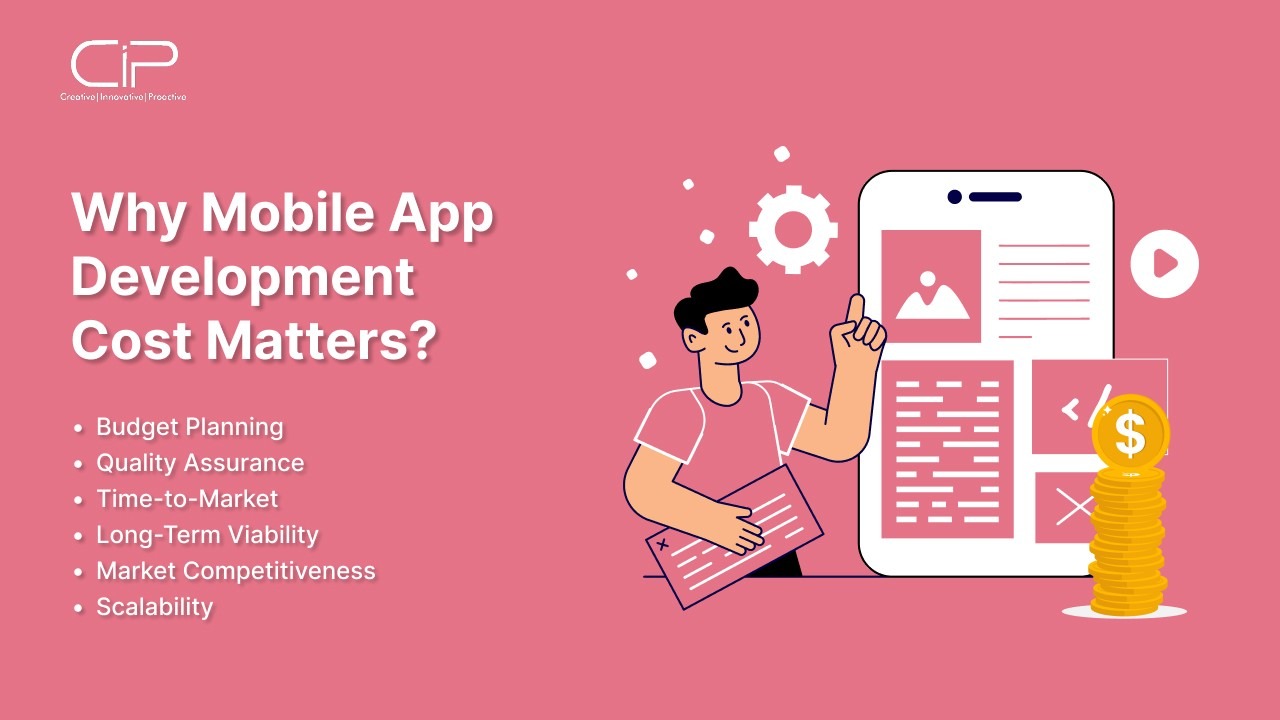
1. Budget Planning
Understanding the cost of mobile app development is crucial for effective budget planning. Without a clear estimate, a project can increase development budget, resulting in delays with incomplete features.
Breaking down the cost factors, such as design, development, testing, and maintenance, businesses allocate multiple resources and ensure that they do not have any financial hurdles. Meanwhile, the cost breakdown helps in prioritizing features and timelines, making any application completion under budget.
2. Quality Assurance
The development cost is directly related to the quality of the final product. Investing in skilled developers, thorough testing, and top-tier design ensures that the app works flawlessly, providing a high-quality user experience. Rushed development or cutting corners to save extra costs can lead to app failures, bugs, and negative user reviews, resulting in damage to the reputation of the brand.
Quality assurance ensures the app meets industry standards, functions properly, and provides value to users.
3. Time-to-Market
Another critical step for staying competitive in the mobile app ecosystem. The development cost also gets affected by how quickly the app is built.
While cutting costs leads to a cheaper app, it increases the development time, which requires fewer resources or less experienced developers. Delaying the release of the application can reduce its relevance in the market, where businesses need to make a proper balance between the development cost and how quickly they want to launch.
4. Long-Term Viability
Long-term viability is another point to be considered by businesses for achieving their goals on a large scale. A cheaply developed app performs well initially but fails to scale or meet the demand.
Investing in solid development, security features, and maintenance ensures that the app will be reliable and adaptable over time.
An app that fails to evolve may eventually lose its user base or fail to keep up with competitors, that ensure why it’s crucial to consider the cost of the overall development process.
5. Market Competitiveness
The selection of reliable mobile app development costs in the UAE also depends on the competitiveness of the market. In a highly competitive market, such as mobile apps, delivering a polished, feature-rich product plays a critical role.
Proper investment in development, design, and testing ensures that the app stands out and remains competitive in a crowded market. Higher competition for applications tends to increase the cost of the development process.
Read also: Mobile App Development Cost in Saudi Arabia
6. Scalability
Scalability is an important part of developing an app where the user base grows, and the app needs to be able to handle increased traffic and usage. Poorly designed apps may face performance issues in terms of scaling.
Therefore, a well-planned budget for mobile app development that allocates resources for building scalable infrastructure and features can prevent potential problems in the future, ensuring the app grows without compromising performance.
Estimating Mobile App Development Cost in UAE
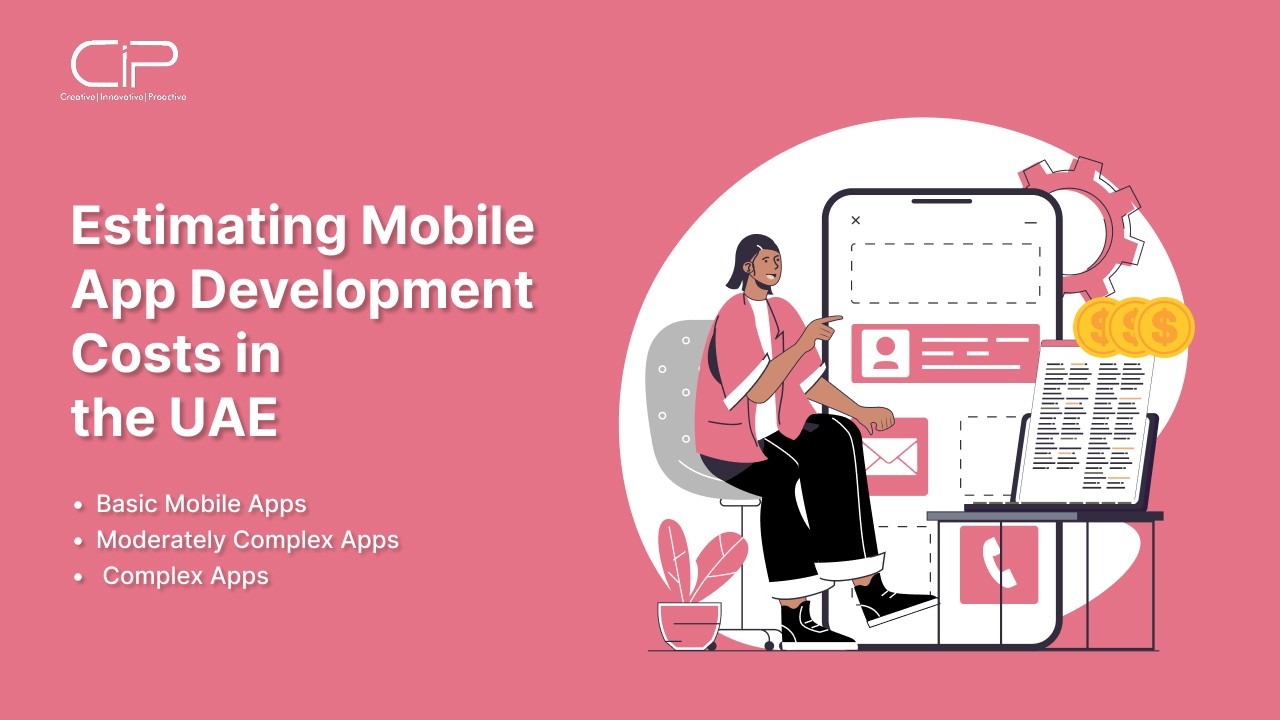
1. Basic Mobile Apps
When it comes to mobile app development in the UAE for basic apps that come with simple functionalities and also informational apps or simple tools, basic apps usually have a cost that can range between AED 25,000 and AED 75,000.
These apps typically have limited features, fewer screens, and little to no back-end functionality that require less effort. Basic apps are quicker to develop and often don’t require extensive design work or advanced features, which is why they have less cost.
2. Moderately Complex Apps
These moderately complex applications charge more than basic apps due to extra features and other tasks. Moderately complex apps include e-commerce apps or apps with user registration and basic back-end integration, typically costing between AED 75,000 and AED 250,000.
These apps involve more detailed design, integration with third-party services, and are robust in terms of features and in delivering the security requirements. Development time for these complex apps usually increases with the complexity of features.
3. Complex Apps
Highly complex apps require real-time features such as messaging, video, or data streaming with some advanced functionalities (AI, AR /VR), or enterprise-level apps that enhance the cost of development from AED 250,000 to AED 500,000.
These apps require specialized development teams, extensive back-end infrastructure, and high-level security features. The complexity of these apps comes with the integration of multiple systems, which enhances both the time and budget required.
Final Thoughts
Mobile app development costs in UAE depend on the complexity, design, features, and expertise of the development team.
It’s easier to get cost-effective solutions where one should keep a balance between cost and quality to ensure that the app delivers value and meets the requirements of the targeted users.
Careful planning and budget allocation while app development ultimately lead to a more successful product that meets business goals and user expectations.
Frequently Asked Questions ( FAQs )
1. What factors influence mobile app development costs in the UAE?
Mobile app development costs in the UAE depend on multiple factors like app complexity, features, platform (iOS, Android, or both), design requirements, and the experience of the development team. Additional costs also include app maintenance, marketing, and updates.
2. How much does it cost to develop a simple mobile app in the UAE?
The budget for a simple mobile app with basic features typically ranges between AED 30,000 and AED 80,000. This can vary depending on the specific requirements and the development company.
3. What is the development timeline for a mobile app in the UAE?
A basic mobile app can take from 2 to 4 months to develop, while more complex apps might take 6 to 12 months or longer. The timeline can also depend on feedback and testing cycles, which also affect the overall budget for development.
4. Is it cheaper to hire a local or international mobile app development company?
Hiring a local development company in the UAE costs more but offers the advantage of better communication and local market knowledge. International developers usually offer more affordable rates but require more coordination and have different working hours.
5. Are there any hidden costs in mobile app development?
Yes, hidden costs can occur in the app development process, such as app store fees, API integrations, security features, ongoing app updates, and customer support. It’s important to discuss these potential costs with the developer to avoid any kind of surprise in the development process.

